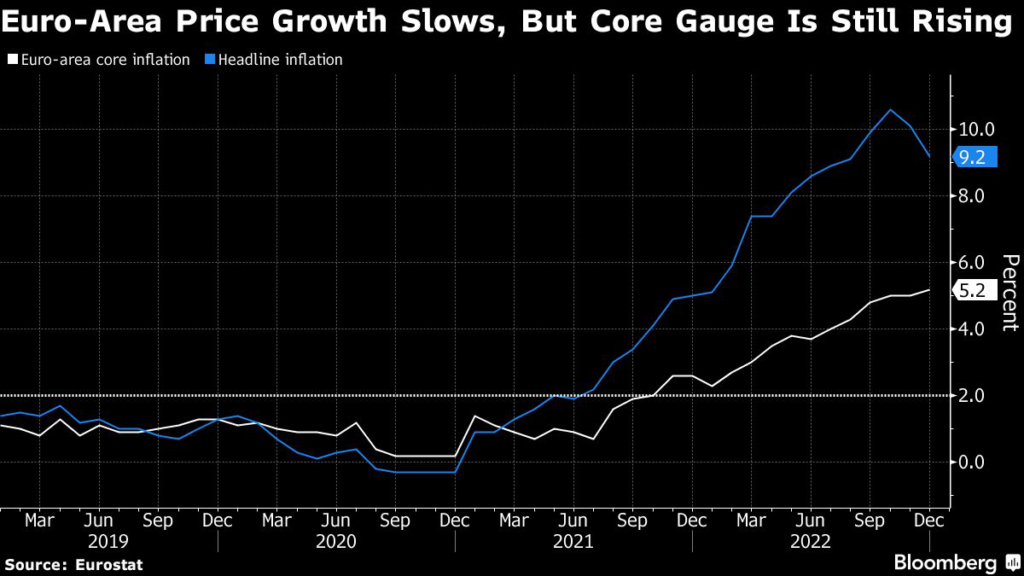The European Central Bank should continue lifting interest rates in half-point steps as workers secure bigger paychecks and underlying inflation pressures remain strong, according to Governing Council member Gediminas Simkus.
(Bloomberg) — The European Central Bank should continue lifting interest rates in half-point steps as workers secure bigger paychecks and underlying inflation pressures remain strong, according to Governing Council member Gediminas Simkus.
There are no grounds to depart from the rate path laid out by the ECB in December — even as energy prices plunge and headline inflation comes off record highs, the Lithuanian central bank chief said in an interview in Vilnius. Monetary tightening may not finish before the summer, he said.
“Core inflation remains strong and demonstrates that the fight against inflation is not over,” Simkus said Tuesday. “There’s a strong case for staying on the course that’s been set for the coming meetings of 50 basis-point increases. In my opinion, these 50 basis-point increases must be taken unequivocally.”
The remarks are the latest salvo in an unfolding debate about whether receding price pressures will soon warrant smaller rate hikes. A second straight half-point increase at next week’s meeting appears to be a done deal, taking the deposit rate to 2.5%. But beyond that, the relative unity that officials have displayed during the 250 basis points of tightening to date is likely to be tested.
Advocates of a more gradual approach include Italy’s Ignazio Visco and Greece’s Yannis Stournaras, with the latter citing a weakening euro-zone economy as grounds for additional caution.
ECB Executive Board member Fabio Panetta told Handelsblatt in remarks published Tuesday that new forecasts in March will require a reassessment of the situation.
Hawks like Simkus, however, have been louder of late. Dutch central bank head Klaas Knot backs a series of bigger moves to bring inflation under control, while Bundesbank President Joachim Nagel agrees that more action is needed. President Christine Lagarde has pledged that the ECB will “stay the course” as borrowing costs reach restrictive levels.
Simkus singled out rising wages as a key reason why price growth will remain elevated, saying it will require a policy response. Euro-area workers have boosted pay demands as inflation eats into incomes and tight labor markets improve their bargaining position.
“Pressures in wage growth are increasing — I expect wage increases to exceed historical averages in the euro area,” he said. “It’s something that’s happening and something we need to take into account because it affects core inflation.”
The region’s economic prospects have brightened in recent weeks thanks in part to declining prices for natural gas amid warm winter weather and well-filled storage facilities. Still, Simkus cautioned that some of the impact of last year’s surge that resulted from the war in Ukraine is yet to come.
“The increase in gas prices may still be not fully reflected in consumer goods,” he said. And despite a recent decline, current market prices are “much higher than previously.”
Investors are betting the ECB will raise its key rate to close to 3.50% by around the middle of the year. Simkus said it’s too early to say where the peak will be, and that “reaching it before the summer may be unlikely.”
“It’s clear to me that the current economic environment requires us to deliver increases of 50 basis points in the coming meetings,” he said. “When we move to the more distant periods of the summer or next autumn, we need to wait and see.”
A rate cut this year — which some economists are predicting — is “not very likely,” he said.
–With assistance from Greg Ritchie.
(Updates with ECB’s Panetta in sixth paragraph.)
More stories like this are available on bloomberg.com
©2023 Bloomberg L.P.










